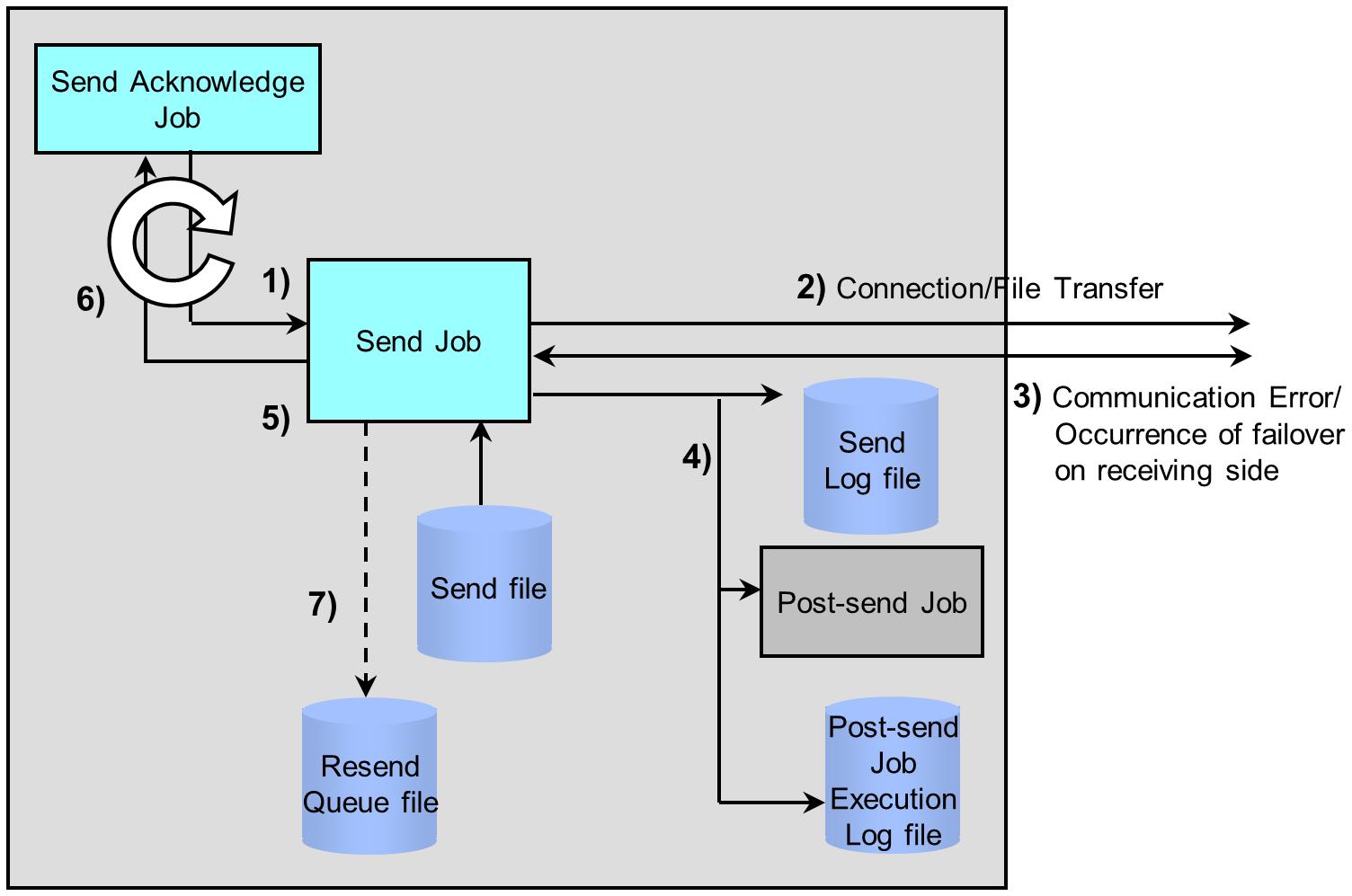Auto Resend
Among errors during file transfer, if an error related to network occurred or if an error at the time of forced stop due to failover in a host on receiving side (HULFT for UNIX/Linux or HULFT for Windows) occurred, HULFT can execute resending automatically. At the time of an unsuccessful transfer, the data can be transferred by resending from the point where the error has occurred. (Checkpoint Resend File)
(1) Flow of Auto Resend
The flow of Auto Resend process is explained in Figure 2.7 .
2) Connection to Receive job
The Send job is connected to the Receive job and transfers the file.
3) Communication error/occurrence of failover on receiving side
If an error occurred somewhere along the communication line during file transfer, or if a forced stop due to failover occurred in the host that installed one of the following products, the Send job detects an error and discontinues the processing:
-
HULFT for UNIX/Linux
-
HULFT for Windows
4) Log information registration, startup of Post-send Job
The Send job writes the unsuccessful result of 3) in the Send Log file, and starts a job registered as the Unsuccessful Job.
5) Notification of sending result when an error occurred in transfer
If an error described in 3) occurred, and the number of specified times for the Auto Resend Retry Count in the System Environment Settings still remains, the Send job executes the procedure below:
-
Stand by for the duration that is specified for the Connect Retry Interval (RETRYTIME) in the System Environment Settings
-
Notify the Send Acknowledge job of the sending result as 'an target for Auto Resend.'
If the Auto Resend Retry Count is exhausted due to an error occurred in 3) or if an error other than described in 3) occurred, the Send job notifies the Send Acknowledge job of the sending result as unsuccessful termination.
6) Auto Resend
The Send Acknowledge job activates the Send job in order to allow HULFT to carry out resending, if the sending result notified by the Send job is true of 'an target for Auto Resend.' Then HULFT carries out the procedure from 1) through 5) the number of times which is specified for the Auto Resend Retry Count (SOCKERR_AUTORETRY) in the System Environment Settings.
7) Registration of Resend Queue file
When the send results received from the Send job are unsuccessful, the Send Acknowledge job writes the result in the Resend Queue file.
-
Executing the Resend File command can resend the Resend Queue written in the Resend Queue file manually.
-
When an error occurs in 3) , the receiving host carries out end-of-job processing and ends the job. If the job on the sending side reconnects HULFT due to auto resending, the job on receiving side will be regenerated.
HULFT carries out auto resending for the following error codes:
Error codes when a communication error occurs
If a communication error occurs during sending, one of the following system-related Status codes is recorded in the Send Log:
- 137:
-
SELECT ERROR
- 140:
-
SOCKET READ TIME OUT
- 141:
-
SOCKET READ ERROR
- 142:
-
SOCKET WRITE ERROR
Error codes when a failover occurs on the receiving host and the host is forcibly stopped
If a failover occurs on the host on the receiving side, one of the following error codes is recorded in the Send Log:
- 700-591
-
- 700:
-
Status code of the Send program (An error occurred at the host on the receiving side)
- 591:
-
Status code of the host on the receiving side indicating that it was forcibly terminated
For details, refer toError Codes and Messages of the host type on the receiving side.
A forced stop due to a failover on the host on the receiving side can be detected if the following products are installed on the host:
-
HULFT for UNIX/Linux
-
HULFT for Windows Ver.7.3.0 or higher
Error codes when a data verification error occurs on the receiving-side host
If a data verification error occurs on the receiving-side host, one of the following error codes is recorded in the Send Log:
- 700-535
-
- 700:
-
Status code of the Send program (An error occurred at the host on the receiving side)
- 535:
-
Status code of the receiving-side host indicating that a data verification error occurred
For details, refer to Error Codes and Messages of the host type on the receiving side.
